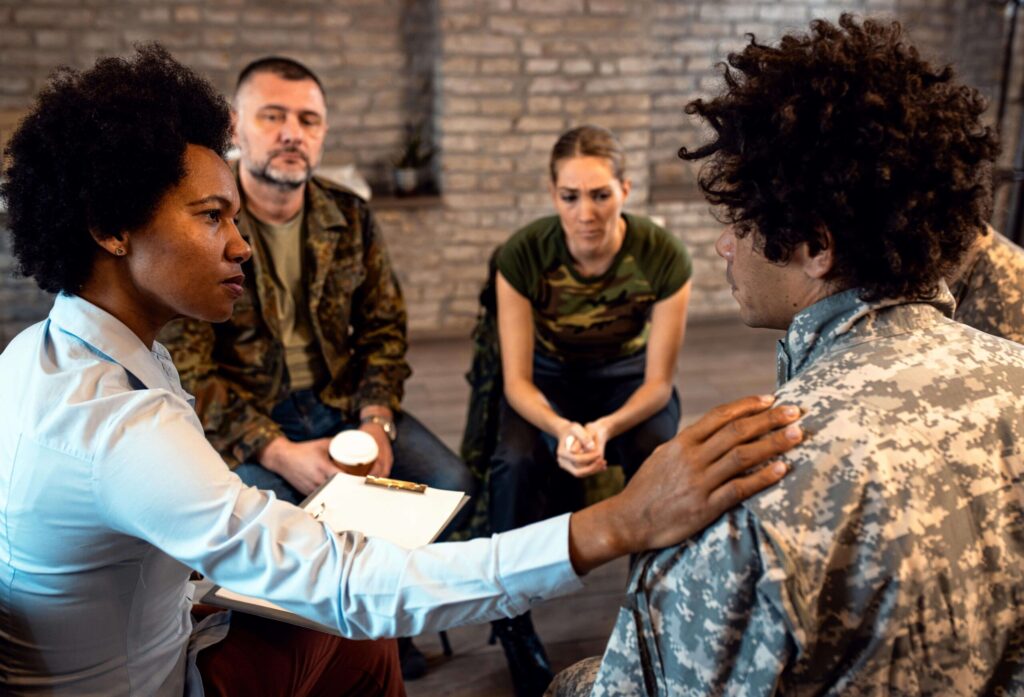Building a Strong Support Network for Veterans

Transitioning from military service to civilian life is a significant change, and for many veterans, it can feel isolating. The camaraderie of the military, where everyone works as a team, often feels difficult to replace in civilian life. However, building a strong support network can bridge that gap, providing not only emotional support but also practical resources to navigate this new chapter.
In this post, we’ll explore why support networks matter, how to build and strengthen them, and the resources available to help you reconnect, rebuild, and thrive.
Why a Support Network Matters
For many veterans, the challenges of reintegration include finding a job, navigating VA benefits, or even adjusting to a new sense of identity outside of the military. These challenges can sometimes lead to feelings of isolation or stress.
Having a strong support network can:
- Provide emotional stability during tough times.
- Offer practical advice from others who’ve walked a similar path.
- Help you find resources for housing, employment, or health care.
- Strengthen your connection to the community and give you a sense of belonging.
Research shows that veterans with strong social networks experience better mental health and overall well-being compared to those who feel isolated.
How to Build Your Support Network
If you’re looking to establish or expand your support network, here are some practical steps:
- Join Local Veteran Groups:
Many communities have veteran organizations like the American Legion, Veterans of Foreign Wars (VFW), or local nonprofits. These groups host events, provide resources, and offer a chance to connect with others who share similar experiences. - Attend Community Events:
Look for community events that celebrate veterans or focus on military service. These gatherings can be great opportunities to meet others, share stories, and find new allies. - Leverage Online Communities:
If in-person events feel intimidating or aren’t accessible, consider joining online forums or social media groups. Platforms like Facebook have veteran-specific groups where members share advice, resources, and encouragement. - Participate in Workshops or Training Programs:
Many organizations host workshops focused on career transitions, mental health, or financial planning. Attending these programs not only helps you learn but also introduces you to others with shared goals. - Reconnect with Former Service Members:
Reach out to old friends or colleagues from your time in the service. Rebuilding those bonds can provide comfort and a familiar sense of camaraderie.
The Role of Family and Friends
While fellow veterans can provide unique insights, your family and friends are also critical parts of your support system. They know you best and can offer consistent encouragement.
To strengthen these relationships:
- Communicate openly: Share your challenges and needs so they can understand how to help.
- Educate them: Help your loved ones understand what you’re going through by sharing resources about veteran transitions.
- Be patient: Adjusting to civilian life is a process, and your family may also need time to adapt.
Resources to Help You Get Started
If you’re not sure where to begin, there are numerous organizations ready to assist veterans in building a support network:
- Veterans Advocacy Associates: We’re here to help you connect with the resources you need, from career counseling to mental health support.
- Veterans Crisis Line: For immediate emotional support, call 988 (Press 1).
- Team RWB: A national nonprofit focused on connecting veterans through fitness and community events.
- DAV (Disabled American Veterans): Provides local chapters and events for disabled veterans.
- Hire Heroes USA: Offers career mentorship and networking opportunities.
Conclusion:
Building a strong support network is one of the most important steps you can take as a veteran transitioning to civilian life. Whether you’re reconnecting with old friends, joining a local group, or simply starting a conversation with family, remember that no challenge is too great when shared with others.
At Veterans Advocacy Associates, we’re committed to being part of your support system. If you’re looking for resources, advice, or just someone to talk to, don’t hesitate to reach out to us.
📧 Email: [email protected]
📞 Phone: (951) 296-6755 or 1-888-345-3033
📍 Visit Us: 25185 Madison Ave, Suite A, Murrieta, CA 92562
💙 Together, we can help you find the support and strength you need to thrive.
